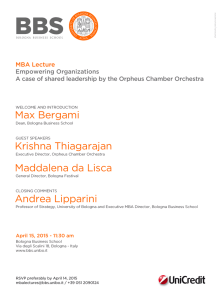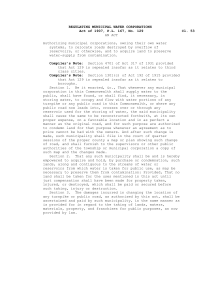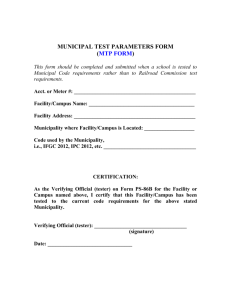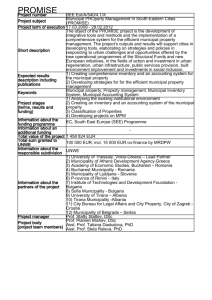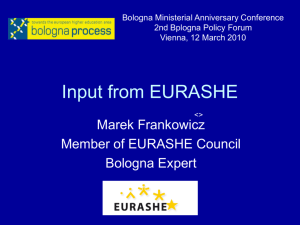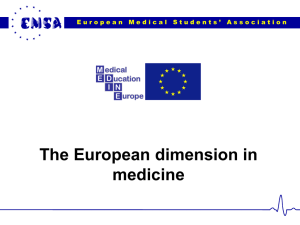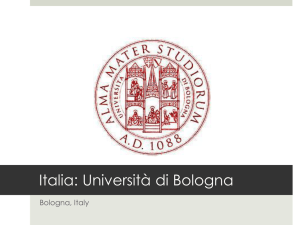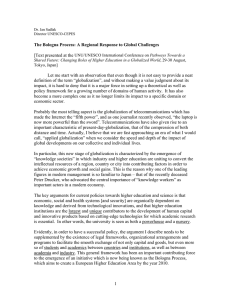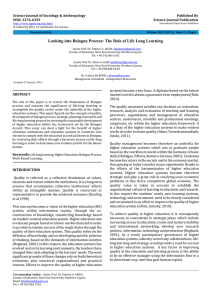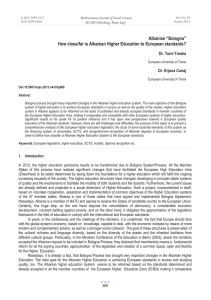The ecoBUDGET experience in the City of Bologna
advertisement
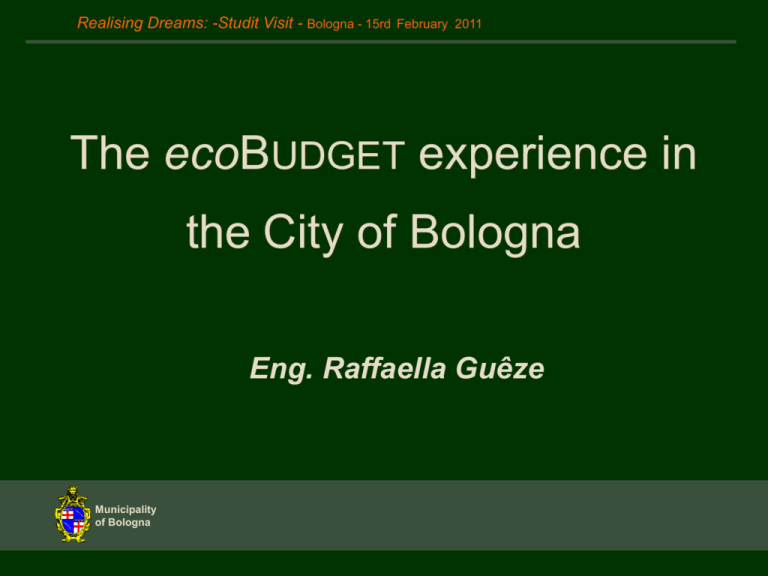
Realising Dreams: -Studit Visit - Bologna - 15rd February 2011 The ecoBUDGET experience in the City of Bologna Eng. Raffaella Guêze Municipality of Bologna ecoBUDGET LIFE project > Period: 3 years (Sep 2001 – Aug 2004) > Tot Funds: 2,3 mil. € > Participants : Växjö, Bologna, Ferrara, Lewes, Heidelberg, Dresden, Amaroussion, Kalithea, ARPA, ICLEI Spending within natural limits! Creation of the Local Implementation Team (LIT) ecoBUDGET in Bologna has been promoted by the Environmental Quality Unit, creating an opportunity to develop a collaborative path amongst different local realities and the local government, institutions and other organisations. During the first phase, a Local Implementation Team (LIT) was established in order to integrate the main areas of expertise within and beyond the municipal administration, thus guaranteeing an intersectoral approach. Members of the LIT: Local Project Co-ordinator Environment Unit (Energy,soil and sub-soil, noise, green areas, electromagnetic pollution, air quality, water) Mobility Department Urban Planning Department Local Public Transport Enterprise Municipal Enterprise for Water, Energy and Waste The starting point of ecoBUDGET Stable Climate (3) Quiet Environment (1) Soil Quality (1) SER Availability of material (1) Green Areas (1) The resources involved in ecoBudget mostly mirror the environmental components shown in the 2nd State of the Environment Report (SER) of the Municipality of Bologna, with more than 100 indicators. Once the main resources were identified, a set of indicators which best represented those resources was selected (approximately 1-3 indicators per resource, as shown in figure). Air Quality (3) The choice of the environmental resources considered in the local budget activity was thus the result of co-operation that took into account not only the priorities of environmental specialists but also the city’s priorities The Environmental Master Budget and the Budget Balance The Master Budget and the Budget Balance are approved by the City Council and, incorporated in its entirety as one of the administration's main tasks. The administration received the mandate to implement ecoBUDGET measures in the authority. Targets and actions • The choice of mid term targets has often been influenced by targets specified by national or European legal standards (e.g. air quality, waste management, etc.) • The planning of actions is undertaken by specific sector plans like the energy plan, the traffic plan, the territorial structural plan etc. • Actions have been described in detail within the Master Budget document indicating responsibility for each action. Only actions formally approved and financed in the monetary budget have been taken into account The path of ecobudget 2001 – 2004 ecoBudget LIFE project February 2003 Ratification 1st Master Budget May 2004 Ratification 1st Balance Budget June 2004 Municipal administrative election December 2004 ecoBudget Asia October 2005 second ecoBudget cycle started June 2009 Municipal administrative election January 2010 Realing Dreams Master Budget 2011- Budget Balance 2010 The new structure for ecoBudget •2 drafts of law National and regional working groups •national guidelines for the environmental budget more emphasis to the action to reach targets •action in the MB their realisation into the BB •add set of indicators for the performance of the municipality •new political mandate target RACCOLTA DIFFERENZIATA 35 30 trend indicator % 25 28,3 29,4 30,9 24,4 21,8 22,6 2001 2002 20 15 10 comprehention of phenomenos 5 0 2003 2004 2005 2006 Master Budget 2006 Mandate targets have been defined Short term according to the priorities indicated defined within political programme mandate results of undertaken measures by targets have been according Sectoral Plans to expected Integration with other planning instruments Aalborg Commitments (general targets) Specifical targets eco BUDGET SER ValSAT Knowledge framework Structural Plan TARGETS Actions, Plans and Programmes Evaluation, verification, and monitoring of targets Integration between targets and actions, plans and programmes Social balance financial budget Success factors Good planning of administrative aspects Involve the political sphere from the beginning Clear definition of responsibilities Define interlinkages with other processes and instruments Encourage debates during the Committee of the City Council Dissemination of the project not just in the administration, but also in the enterprises (viz. public transport company) and to the citizens through articles, website information, e-mails and other written communications. Lessons Learned Persuade and encourage the involvement of other departments of the Municipality Use the Environmental Master Budget to give a structure and a frame to the other environmental work Use the data on the environment as a requirement to consult local citizens regularly Confusion in the terminology Departmentalism No technicians responsible for each indicator No documented routines for reporting Choose to many indicators and not just key ones No documented plan of actions with corresponding responsibilities Than you!
